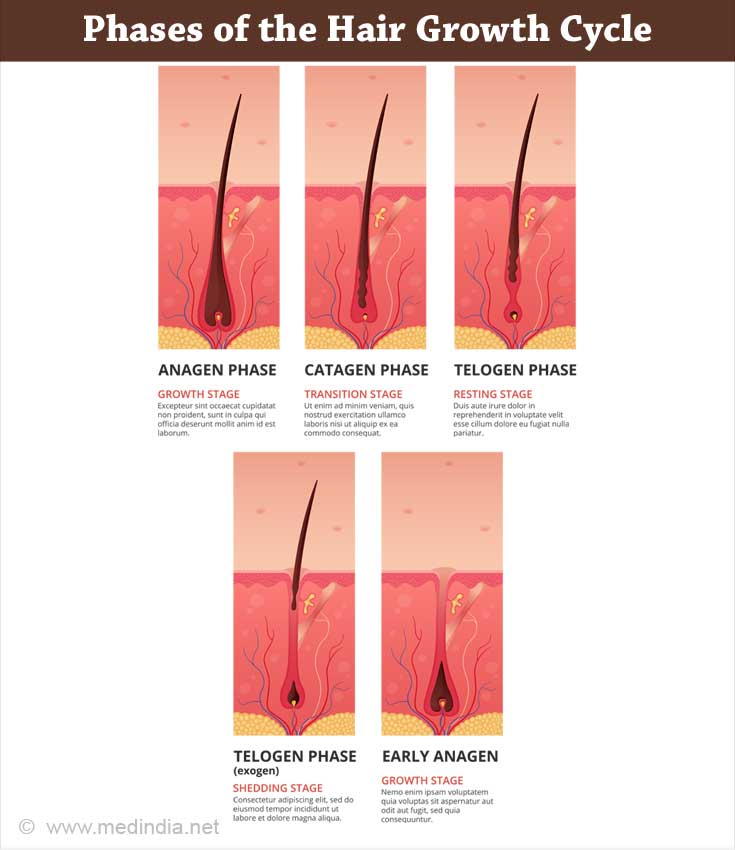- The Hair Growth Cycle - (https://www.philipkingsley.co.uk/hair-guide/hair-science/hair-growth-cycle.html)
- Stress and the Hair Growth Cycle: Cortisol-Induced Hair Growth Disruption - (https://jddonline.com/articles/stress-and-the-hair-growth-cycle-cortisol-induced-hair-growth-disruption-S1545961616P1001X/)
- Stress and the Hair Growth Cycle: Cortisol-Induced Hair Growth Disruption - (https://jddonline.com/articles/stress-and-the-hair-growth-cycle-cortisol-induced-hair- growth-disruption- S1545961616P1001X/)
- Hormonal Effects of Hair Follicles - (https://www.ncbi.nlm.nih.gov/pmc/articles/PMC7432488/pdf/ijms-21-05342.pdf)
- Cause of Androgenic Alopecia: Crux of the Matter - (https://www.ncbi.nlm.nih.gov/pmc/articles/PMC4174066/pdf/gox-1-e64.pdf)
- Androgenic Alopecia - (https://www.sciencedirect.com/topics/medicine-and-dentistry/androgenic-alopecia)
Introduction
Hair is an essential part of the body from an aesthetic as well as physiological point of view. Hair follicles are living tissues anchoring the hair strands, which are made up of dead cells called keratin. It can reflect our internal health and moreover assessing hair and scalp health can help in ascertaining vitamin deficiencies, skin sensitivities as well as hormonal imbalance.
How do hormones affect our overall hair health?
Many of the steroid hormones such as testosterone and estrogen whose influence are directed mainly towards reproductive functions in the body also have prominent role in affecting homeostasis, metabolism, and growth of other bodily tissues such as skin, hair and nails.
Hair growth goes through various phases based on the variable action of hormones in response to the important milestones of life such as puberty, pregnancy, menopause or andropause and to traumatic stressful life situations. Most vital hormones affect hair growth to such an extent that the internal hormonal balance can be assessed from the external appearance or quality of hair.
What are the Hair Growth Phases?
Hair follicles form the basic unit of hair cycle. Each hair follicle undergoes each of the growth phases for different durations, hence the growth cycle varies for each hair strand. Each hair cycle lasts for 3-5 years(1✔ ✔Trusted Source
The Hair Growth Cycle
Go to source).

Each hair goes through the following phases:
- Anagen or growth phase
- Catagen or transition phase
- Telogen or resting phase
- Exogen or shedding phase
Ninety percent of our scalp hair are mainly in the anagen phase.
The anagen phase (growth phase), which lasts for 2-8 years, involves the period of rapid hair growth from the hair follicles which continue to grow until they fall out at the end of their lifespan.
The catagen phase (transition phase) lasts for 10-15 days where the hair follicles shrink, and the hair strand begins to detach itself from the hair root receiving less amount of blood supply and nutrition. Only 5% of the scalp hair are in catagen phase.
In the telogen phase (resting phase), the hair strand completely stops receiving blood supply and nutrition and is waiting to be shed. This phase extends for 3 months and only 10-15% of scalp hair are in this phase at a time.
The exogen phase (shedding phase) involves shedding of the old hair strand through washing or brushing and the beginning of new hair growth from the hair follicle. It lasts for 2-5 months and is an extension of the telogen phase.
How Hormones Affect Hair Growth
Cortisol and Hair loss:
It is a stress hormone and is responsible for cyclic regulation of the hair follicles. A study has shown that stress induces high levels of cortisol which increases the breakdown of skin components such as hyaluronic acid and proteoglycans making the scalp dry(2✔ ✔Trusted Source
Stress and the Hair Growth Cycle: Cortisol-Induced Hair Growth Disruption
Go to source).
Androgens and Hair loss:
One among several androgens (male sex hormones) in the body is testosterone, also a steroid hormone and is indirectly linked to hair loss. Dihydrotestosterone, also called DHT, is produced from testosterone through enzymatic action. It is one of the main causes for androgenetic alopecia and most common type of hair loss
Estrogen and Hair loss:
Estrogen, also called the female sex hormone, prolongs the duration of the period when the hair follicles are in the growing phase and hence prevents hair loss showing protective effects to the hair. Estrogen counteracts the effects of androgens.
Melatonin and Hair loss:
Often called the sleep hormone, it is secreted by the pineal gland in the brain and it activates certain growth factors which protect the hair follicles against oxidative stress and subsequent damage.
Progesterone and Hair loss:
Progesterone also improves hair growth by inhibiting the conversion of testosterone to DHT at the level of hair follicle. Decrease in progesterone and estrogen can increase levels of androgens in the body(3✔ ✔Trusted Source
Hormonal Effects of Hair Follicles
Go to source).
Why does Hormonal Imbalance Occur
Hormones, as mentioned previously, are the chemical messengers secreted by vital glands in the body intended to bring about physiological changes in the body or maintain homeostasis.
Hormone secretion can go awry due to various reasons such as erratic working hours, irregular sleep patterns, unhealthy diets, exposure to environmental toxins. Certain physiological stages across the lifespan such as pregnancy, puberty, menopause, stressful episodes can lead to spike in stress hormones. Besides this, the thyroid gland can also trigger hormonal imbalances which can aggravate hair loss.
Signs of Hormone-Related Hair Changes
Hair loss affecting mainly males is called male pattern baldness where there is hair loss observed on the crown portion of the head and receding hairline.
Androgenetic alopecia: Females observe widened partition and hair thinning called female pattern hair loss. Both these patterns of hair loss are known as androgenetic alopecia. Androgenetic alopecia is the genetic predisposition to increased response to androgens. It is the most common form of hair loss, observed among both males and females, which affects 80% of men and 50% of women(5✔ ✔Trusted Source
Cause of Androgenic Alopecia: Crux of the Matter
Go to source).
Telogen effluvium is another type of hair loss where a major portion of the hair follicles shift to shedding phase from the growth phase due to increase stress, prolonged illness or hormonal imbalance.

Hormones Causing Hair Loss in Men and Women
The main hormones responsible for hair loss among males are Dihydrotestosterone (DHT) and cortisol. Cortisol is the stress hormone which is produced in high levels when the body undergoes physiological or mental stress for prolonged duration.
DHT and Hair loss: DHT shortens the anagen (growth) phase of hair follicles thus giving rise to hair strands which grow short and fall out faster.
Thyroid Hormones and Hair loss: Women with low levels of thyroid hormones (hypothyroidism) face shrinkage of hair follicles giving rise to hair thinning.
Menopause and hair loss: Menopause is the period characterized by decrease in estrogen as well as progesterone levels and subsequent increase in androgen levels. This aggravates hair loss among menopausal women.
PCOS and Hair Loss: Hormonal conditions such as (Polycystic ovaries)
Androgenic Alopecia
Go to source).
Tips to Prevent Hair loss due to Hormonal Imbalance
Modifying certain lifestyle factors can help control hormone-related hair growth issues and help prevent hair loss.
- Avoid intake of animal and milk products on a daily basis such as meat, organ meats and sea-foods, whole fat milk, cream, cheese, curd, cottage cheese. This is because they are all high in saturated fats which gets converted to cholesterol in the body and can give rise to DHT production, which is one of the main hair loss promoters.
- Maintaining a healthy sleep pattern helps to regulate the production of melatonin, which is responsible for promoting hair growth as well as regulating sleep cycle. Lack of sleep leads to hormonal imbalance and stress, which can push a large percentage of hair in resting or shedding phase, thus increasing hair loss.

- Including a moderate level of exercise regime in the daily routine has shown to improve blood circulation to the scalp and aid in improving hair growth. However, studies have shown that engaging in strenuous, high intensity exercise can have reverse effect of aggravating hair loss.
- Be cautious while using skin/haircare products, products of personal hygiene since they contain several chemicals, additives, preservatives which have endocrine-disrupting effects and can lead to hormonal imbalances and hair loss. Even fruits and vegetables containing pesticides and insecticides can affect hormonal health.








